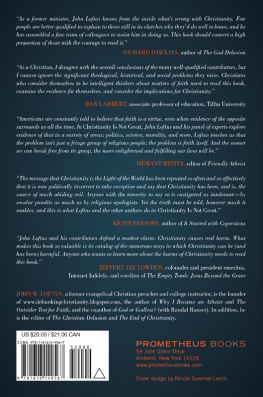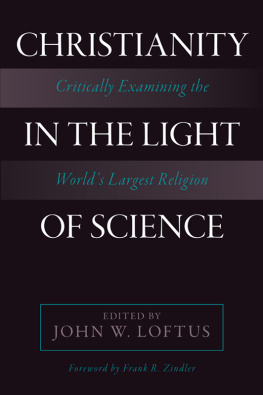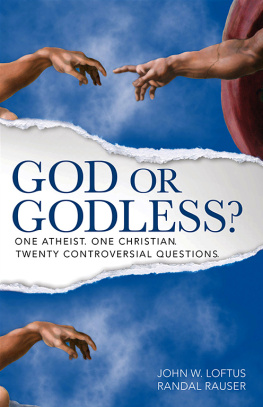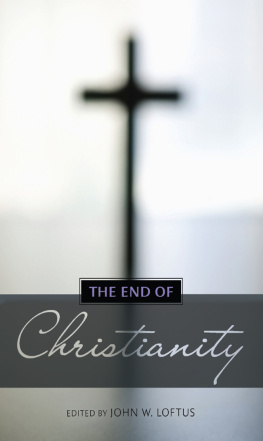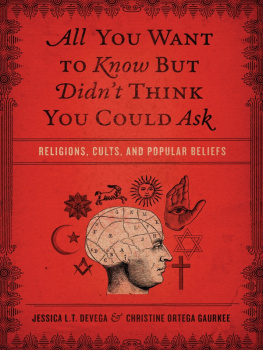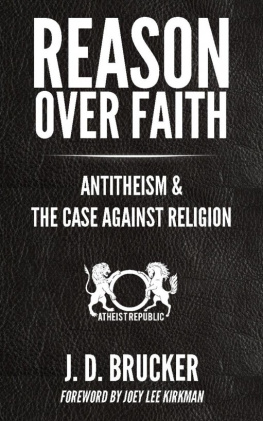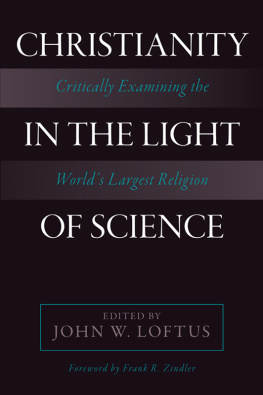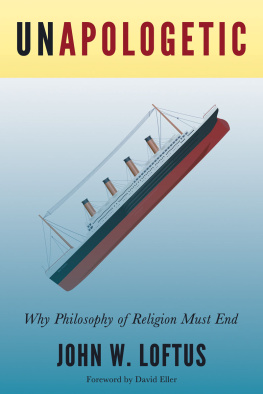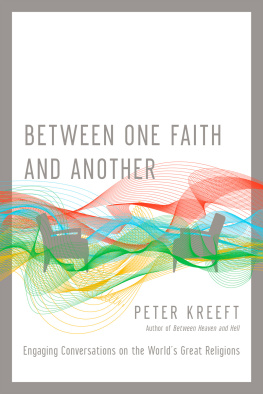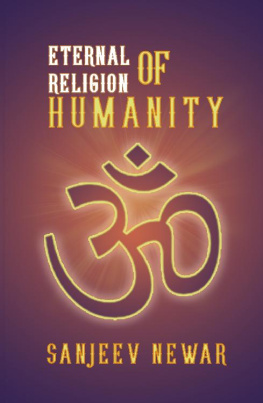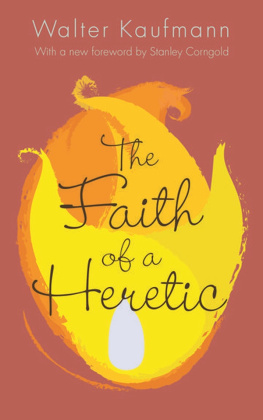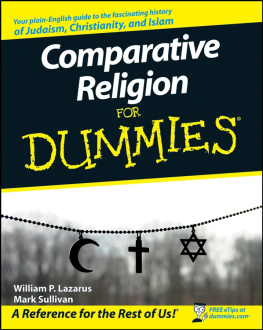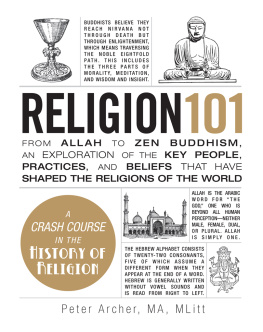Published 2013 by Prometheus Books
The Outsider Test for Faith: How to Know Which Religion Is True. Copyright 2013 by John W. Loftus. All rights reserved. No part of this publication may be reproduced, stored in a retrieval system, or transmitted in any form or by any means, digital, electronic, mechanical, photocopying, recording, or otherwise, or conveyed via the Internet or a website without prior written permission of the publisher, except in the case of brief quotations embodied in critical articles and reviews.
Prometheus Books recognizes the following trademark
mentioned within the text: Carnival Sage
Cover image Clive Tooth/Shutterstock.com
Cover design by Jacqueline Nasso Cooke
Inquiries should be addressed to
Prometheus Books
59 John Glenn Drive
Amherst, New York 142282119
VOICE: 7166910133
FAX: 7166910137
WWW.PROMETHEUSBOOKS.COM
17 16 15 14 13 5 4 3 2 1
The Library of Congress has cataloged the pritned edition as follows:
Loftus, John W.
The outsider test for faith : how to know which religion is true / by John W. Loftus.
p. cm.
Includes bibliographical references and index.
ISBN 9781616147372 (pbk. : alk. paper)
ISBN 9781616147389 (ebook)
1.ReligionControversial literature. I .Title.
BL2775.3.L635 2013
200dc23
2012044552
Printed in the United States of America on acid-free paper

This is the greatest book Loftus has ever produced. Its without question a must-read for believers and any atheists who want to debate them. Superbly argued, air tight, and endlessly useful, this should be everyones first stop in the god debate. Loftus meets every objection and proves the Outsider Test for Faith is the core of every case against religious belief and the one argument you cant honestly get around. It takes religion on at its most basic presuppositions, forcing the believer into a dilemma from which there is no escape: either abandon your faith or admit you dont believe in being logically consistent. After reading it and sincerely applying its principles, anyone who really wants to be rational will be on the road to atheism in no time.
Richard Carrier, author of Proving History:
Bayess Theorem and the Quest for the Historical Jesus
A bold book based on a simple premise: the unexamined faith is not worth believing. Of course, every Christian apologist gives lip service to this premise and claims to have given the tenets of faith a full and fair hearing. Loftus shows just how cheap and hollow such talk usually is. He demands that believers examine their own faith with all of the rigor and skepticism that they direct towards other faiths. To those who condemn the beliefs of others while elevating their own dogmas, Loftus message could come straight from the Gospel: remove the beam from your own eye before you seek to remove the speck from anothers.
Keith Parsons, author of God and the Burden of Proof
Perhaps the most intractable argument against Loftuss Outsider Test for Faith is some version of I cant do it. I cant get far enough outside my emotions and beliefs to examine my own religion like I would any other. As a psychologist I find that credible. We all have a very imperfect and fragmentary ability to see ourselves as others see us. But this in no way undermines Loftuss foundational argument that the outsider test should be the gold standard.
Dr. Valerie Tarico, psychologist
and author of Trusting Doubt
John Loftus will be remembered a century from now for his Outsider Test for Faith.
Frank Zindler, former president of American Atheists
and editor of American Atheist Magazine
When an evangelical minister can ask tough questions about religion and leave the faith, then so can you. John Loftus is the religious believers genuine friend, respecting your intelligence enough to show you how religions really work. His new book questions every religion with the same challenge: What reasons could it really have for claiming to possesses the unique truth? When the faades of familiarity and unquestionability are ripped away, exposing faiths weaknesses to both insiders and outsiders, can any religion pass this test?
John Shook, author of The God Debates

The problem this book addresses is the massive amount of worldwide religious diversity, why it exists, and how to solve it, if it can be solved at all. The goal is to help readers know how to tell which religion is true, if any of them are. My claim is that if we keep on doing the same things, we will get the same results. So far nothing has worked because believers have not considered what their faith looks like to an outsider, a nonbeliever in their particular religion. So why keep on doing the same things? I see no reason why we should. This book presents a sustained case that the only way to settle this problem is with the Outsider Test for Faith (OTF).
The Outsider Test for Faith (OTF) is just one of several arguments I use in my books to demonstrate that the predisposition of skepticism is warranted when examining the evidence for a religious set of beliefs. I argue that skepticism offers the only way for believers to rationally test their faith. There is overwhelming, undeniable, and noncontroversial evidence for the basis of the test in extant sociological, neurological, anthropological, and psychological data.
My focus in this book is on Christianity, especially evangelicalism, best represented by the Evangelical Theological Society and the Evangelical Philosophical Society. This is my target audience. The OTF does not just apply to my target audience though. It applies to anyone with religious faith. I am pleased to note that Thomas Riskas utilizes the OTF quite heavily in his book Deconstructing Mormonism: An Analysis and Assessment of the Mormon Faith (Cranford, NJ: American Atheist Press, 2011). Id like to see more books like this writtenbooks that critically examine other religious faiths with the OTF just as I have done with Christianity.
I have been hammered from all sides by Christian apologists about the outsider test for several years. On the one hand, there are Christians who reject the test as faulty or unfair in some way. I suspect their initial gut reaction is to argue against it because the person proposing this test is an atheist. Since anything an atheist proposes to test religion must be wrong, they try to find fault with it. However, as we shall see, the great Catholic apologist G. K. Chesterton proposed something like it before I ever did. Or perhaps believers just realize their faith wont pass the test. If their faith could pass the test, they would be the first ones pushing it on everyone else.
On the other hand, there are Christians, like Chesterton, who assert that their faith passes the test. Why cant they agree? Against believers who think the test is unfair or faulty, I argue that they fail to understand what it is. Against believers who think their faith passes the test, I argue that they dont really understand what it demands of them. But in the end I thank them, for they have helped me fine-tune the test for this book.
Inside these pages is my final understanding about the test. If someone finds any inconsistency with something I say in this book when compared with my previous writings or blog posts, then I have either learned from my critics how to better express myself or I have changed my mind, and thats a good thing. Ive written this book as if it is the only one my readers have ever read from me, just in case thats the case. So sometimes youll find me using the exact words I used in my previous books.


